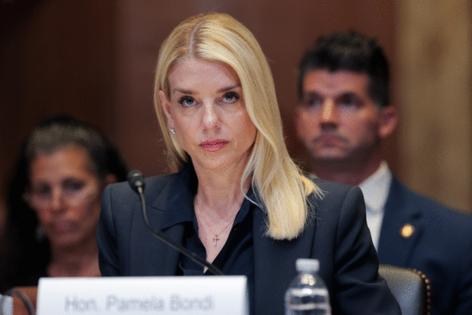Senators express wariness of proposed mergers within DOJ
Published in News & Features
WASHINGTON — The Trump administration and Congress appear to be on a collision course over a plan to overhaul parts of the Justice Department — and whether the White House or Congress holds the power to make those decisions.
Attorney General Pamela Bondi this week defended the fiscal 2026 budget request at House and Senate appropriations hearings, including proposals to fold the work of the Bureau of Alcohol, Tobacco, Firearms and Explosives and the Office on Violence Against Women into other parts of the DOJ.
Congress has passed laws specifically protecting the ability of the ATF and OVW to operate separately. While Bondi insisted the Justice Department would carry out the mergers, lawmakers from both parties suggested that wouldn’t happen without their sign off.
Sen. Patty Murray of Washington, the top Democrat on the Senate Appropriations Committee, told Bondi that the department’s plan to fade OVW into the Office of Justice Programs “violates the intent of the law that we passed” in 2002.
Congress codified OVW “as a permanent, separate and independent office” to implement the Violence Against Women Act, Murray said.
“We did that to make sure that violent crimes against women receive the necessary attention, expertise and resources and to give the office a strong, independent voice within the Justice Department and federal government,” Murray said.
At the hearing, Bondi responded by saying she “will follow the law,” but “will not keep that as a separate grant entity.”
“You and I can disagree all day long on what the law is. That’s being consolidated into the Office of Justice Programs,” Bondi said.
A White House budget document suggests the administration thinks congressional action is needed. The White House request includes proposed language that would entirely delete a subsection of law that requires OVW to be “a separate and distinct office” with a director who reports to the attorney general and has “final authority over all grants, cooperative agreements, and contracts awarded by the Office.”
Bondi was just as confident when Sen. Chris Van Hollen of Maryland, the top Democrat on the Appropriations subcommittee that oversees DOJ funding, asked her about the idea of an ATF-DEA merger included in the Justice Department’s fiscal 2026 budget request. He said current appropriations law requires congressional approval to make the merger happen, and sought an assurance from Bondi that she would follow the law.
Congress for years has appropriated funding to the bureau as its own line item. And a fiscal 2024 government funding bill stipulates that no funds may be used to “transfer the functions, missions, or activities” of the ATF to “other agencies or Departments.”
Bondi responded that the DOJ would comply with the budget law.
“ATF will keep its brand. DEA will keep its brand,” Bondi said, but the agencies are “going under one umbrella, one umbrella, doing away with the bureaucracy at the top.”
Van Hollen said he appreciated that the department would comply with the appropriations law. But Bondi then said: “We don’t need congressional action for this move, however.”
“Well, I thought I just got clarification,” Van Hollen said. “It’s going to be important to both the chairman and myself to understand your position as attorney general on whether or not you can proceed with this merger without congressional action.”
As the hearing drew to a close, Bondi said she wanted to clarify a point and said funds would be appropriated by Congress. “We hope you support that, the funding for the ATF and the DEA to work under one umbrella,” Bondi said.
Bondi’s description at the hearing conflicts with language in the department’s summary of their fiscal 2026 budget request, which said ATF functions would be merged into the DEA, which would “remain as a single component.”
“We’ll have to compare notes and see whether we’re on the same page,” Van Hollen responded.
After the hearing, when asked if Congress needs to act to effectuate an ATF-DEA merger, Sen. Jerry Moran, R-Kan., who leads the Senate Appropriations subcommittee that oversees DOJ funding, said the full panel “will be involved in determining how that occurs, if it occurs.”
Outside of concerns about following the law, the Trump administration’s merger idea drew a cold response from some Senate Republicans.
At the hearing, Moran said, “some of the proposals will require further deliberation” and mentioned concerns he’s heard about the ATF proposal. He told Bondi it’s his hope that the department would work with the subcommittee to “evaluate the reorganization proposals and where appropriate make changes.”
“I am a little bit concerned about the ATF proposed merger with DEA. I’m not going to ask a question on that so much,” Sen. Shelley Moore Capito, R-W.Va., told Bondi. “We have received a lot of concern from constituents if that would dilute any of the different functions that each one of those does.”
In an interview, Sen. Lindsey Graham, R-S.C., said: “I don’t like it so far.”
©2025 CQ-Roll Call, Inc., All Rights Reserved. Visit cqrollcall.com. Distributed by Tribune Content Agency, LLC.







Comments